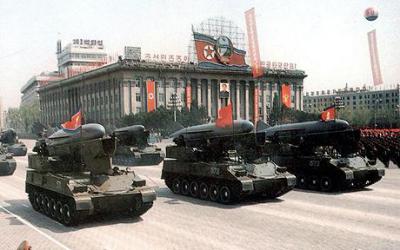North Korea’s response has been the development of weapons of mass destruction (WMD). In light of the widening economic and conventional forces gap, the North may have regarded the nuclear weapons card as the most economical and effective option.
For North Korea to become a nuclear weapon state, it must satisfy four conditions: possession of nuclear warheads, deployment of workable missiles, success in nuclear testing, and acquisition of miniaturisation technology. While North Korea has at present fulfilled three of the four criteria of a nuclear state, specialists believe that it has not yet acquired the miniaturisation technology to mount nuclear warheads.
South Korea’s response to North Korea’s nuclear threat has been two-fold. One is to seek an American nuclear umbrella within the framework of the ROK-US alliance, and the other is to further enhance its overall conventional defence capabilities.
What factors then account for the dynamics of inter-Korean military spending and arms races? Although South Korea has used the North Korean threat to justify its military spending, the pattern of defence spending in the South did not respond to threats from and/or military spending of the North. The South tends to regard the threat from the North as constant. As such, a routine bureaucratic increase has become a major variable affecting the level of defence spending.
Overall macro-economic conditions have played an equally important role in shaping the level of South Korea’s defence spending. Acute fiscal crisis has often entailed a sharp decrease in defence spending as shown by the Lee Myung-bak government’s recent efforts to reduce the defence budget to cope with economic difficulties followed by the global financial crisis in 2008.
Alliance effects also appear to have profound impacts on defence spending. When there was a strong US security commitment, South Korea’s defence spending was minimal. But when the United States showed signs of disengagement or waning security commitment, South Korea proceeded to increase its defence spending.
What counts most in the domestic political landscape is executive leadership. Defence spending has by and large been shaped by the political leader’s preference and style. Park Chung-hee’s commitment to over-spending and Kim Dae-jung’s preference for less spending can be accounted for by leadership preference and style.
How about North Korea? The North did not respond to South Korea’s defence spending either as expected under the logic of conventional arms race. Nonetheless, its threat perception has continued to shape its arms race behavior, if not its defence spending. North Korea’s decision to go nuclear appears to be affected by two factors: its threat perception of American nuclear and ROK-US combined forces’ conventional forces, and the need to seek the most economical way of dealing with such threats. Protracted poor economic conditions and difficulties in acquiring advanced weapons and equipment from foreign countries could have justified and fostered such behaviour.
North Korea’s rapid increase in defence spending can also be explained in part by the adoption of the ‘military-first politics’ (seongun jeongchi). Given that North Korea does not have any alliance comparable to that of ROK-US, the alliance effects hypothesis may not be applicable. Historically speaking, however, North Korea’s defence spending used to be affected by the varying nature of its security ties with China and the Soviet Union. When military assistance from these two countries was robust, North Korea’s defence spending rose slowly, whereas it increased rapidly when such assistance was withheld.
Failure to block North Korea’s full-fledged nuclearisation could set off a nightmarish nuclear domino effect in the region. But denuclearisation of North Korea cannot be realised without addressing and assuring its security concerns. In this regard, trust-building with North Korea through the lifting of economic sanctions should be a useful first step, which should be followed by an American assurance of non-hostile intent and policy as well as concrete measures for peaceful co-existence, a peace regime replacing the armistice agreement, and diplomatic normalisation with Pyongyang. North Korea should also show its sincere efforts and concrete moves toward denuclearisation.
Chung-in Moon is Professor of political science at Yonsei University, and formerly served as Dean of Yonsei’s Graduate School of International Studies and Chairman of the Presidential Committee on Northeast Asian Cooperation Initiative. Sangkeun Lee is a Ph. D. candidate specialising in North Korean politics at the Department of Political Science, Yonsei University.
This article is a summary of a paper originally published in Asian Perspective 33(4), 2009, 69-99, which can also be found here.

